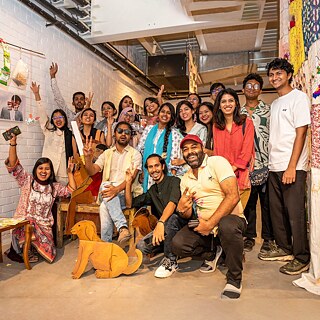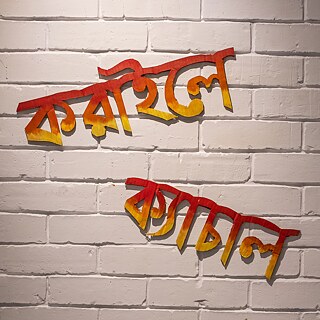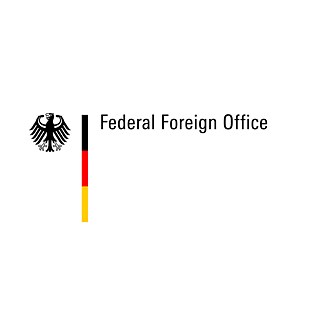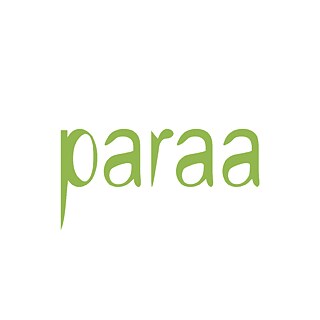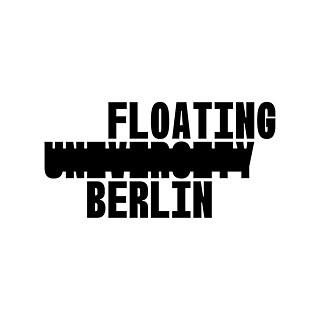Winter school
A look into Hoichoi: Engage, Interact, Play!
Courses under the Winter School
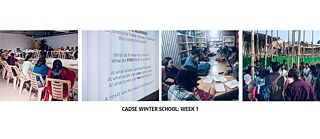
The CADSE Winter School began on February 9th, 2024, bringing together a diverse group of students and professionals for a course on the roles and politics of experts like architects and planners. Participants engaged in discussions on participatory methods and power dynamics, as well as practical exercises and activities led by Korail youth. The program is tailored for those interested in the intersection of architecture, design, and community development, especially in working with vulnerable communities. | © Paraa and Goethe Institut Bangladesh
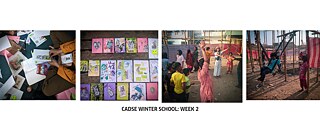
During the second week, all sessions took place in Korail. On February 16th, we hosted a zine-making workshop with Floating e.V., where students created personal zines and engaged in outdoor activities facilitated by visiting artists Ace and Puer Deorum. The session included non-verbal communication exercises and feedback from artist Monica Jahan. On February 17th, Tarannum Nibir conducted a day-long visual storytelling session, with participants working in groups to capture and present stories on various Korail-related topics, alongside games and activities led by Korail youths and feedback from photographer Mahmud Rahman. | © Paraa and Goethe Institut Bangladesh
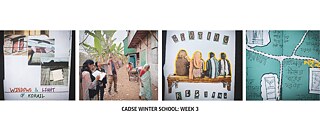
During Week 3 of CADSE, participants explored architectural and environmental aspects within Korail through immersive activities. On Day 1, they engaged in a zine-making session, documenting architectural elements and interacting with residents. On Day 2, a visual storytelling workshop focused on topics like local drainage and the Hijra community, with participants capturing photos and presenting their findings, followed by a session on environmental issues led by Bareesh Chowdhury from BELA. | © Paraa and Goethe Institut Bangladesh
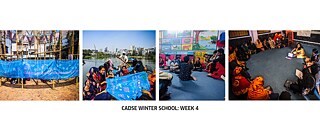
Day 1: Prof. Afsana Haque and Prof. Musleh Hasan Uddin led a session on affordable housing, using the Match Factory area as a case study. Participants then visited Monika Jahan Bose's exhibition "চলমান" at Neighbourhood Art Space.
Day 2: Zakiul Dip and Tarannum Ali Nibir conducted a session on technical photography and research. Participants captured images in Korail for an upcoming exhibition, followed by presentations and feedback.
Day 3: Monica Jahan Bose led a workshop with Korail women on climate issues and creative practice, culminating in block printing and painting a sari. The day ended with a visit to her exhibition and a lunch discussion.
|
© Paraa and Goethe Institut Bangladesh
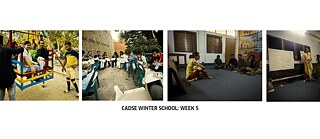
Day 1: Parsa Sanjana Sajid led a critical reflection writing session titled "কড়াইল নিয়ে ভাবি" , offering guidance on good writing and creativity. Participants engaged in interactive exercises and had their writings reviewed for the "Snapshot: Korail City" exhibition.
Day 2: At the Wellbeing Summit at Bangla Academy, participants attended sessions on food, mindfulness, and parenting. The day ended with fun activities like riding the Nagordola and enjoying snacks like fuchka and panipuri.
|
© Paraa and Goethe Institut Bangladesh
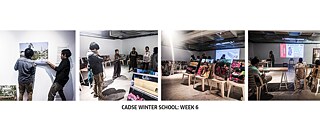
Day 1: Minaal Choudhury and Samina Yasmin from Bonhishikha led a session on 'Unlearning Gender,' discussing gender concepts, roles, and misconceptions. Afterward, participants prepared for the 'Snapshot: Korail City' exhibition.
Day 2: At Drikpath Bhabon, Iffat Nawaz led a reading session with the Sister Library project, focusing on personal writing and overcoming writer's block. The day concluded with the 'Snapshot: Korail City' exhibition, showcasing participant photos on various Korail topics, followed by a rooftop iftar organized by Goethe-Institut.
|
© Paraa and Goethe Institut Bangladesh
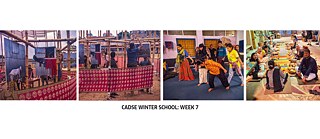
Snapshots: Korail City Exhibition The CADSE team, facilitated by Tarannum Nibir, installed a photography exhibition at Ershad Maath and gathered community feedback. Intern Siam conducted a sound experiment using found objects and software.
Week 7, Day 2: Theater Session Diana and Shahin from Prachyanat led an improvisation theater session, highlighting its connection to body and soul. Participants engaged in interactive activities, ending with a drama presentation and a group iftar.
|
© Paraa and Goethe Institut Bangladesh
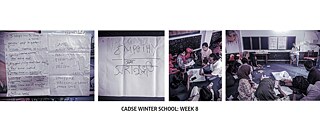
Day 1: The program began with a focus on exploring cultures, led by Kazi Arefin and Ruhul Abdin. Participants shared insights on Korail's culture, followed by a walk to engage with locals for diverse perspectives.
Day 2: Reflecting on culture continued with a roleplay session, followed by hands-on mapping activities in Korail. Split into teams, students scouted potential locations for the upcoming Korail City of Culture Festival in December 2024.
|
© Paraa and Goethe Institut Bangladesh
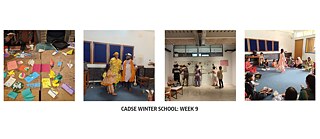
Participants gathered to discuss their design progress and ideas. They planned a visit to Korail and decided to host a cultural event on April 26th to explore the cultural richness of Korail. To invite the Korail residents, they got creative and made invitation cards using leaves, colored paper, and crafts. | © Paraa and Goethe Institut Bangladesh
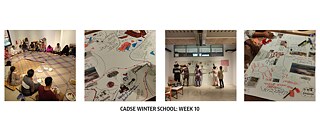
Participants convened to plan a cultural event in Korail on April 26th, creating unique leaf and paper invitations. The event featured ice-breaking games, performances, and a captivating display by local Baul artists, aiming to grasp the essence of Korail's culture.
At Shala_Neighbourhood Art Space, a design festival engaged Korail residents in crafting their ideal event, emphasizing inclusivity and creativ ty. Interviews were conducted to delve deeper into community perspectives, culminating in a reflective discussion on the workshop's impact
|
© Paraa and Goethe Institut Bangladesh
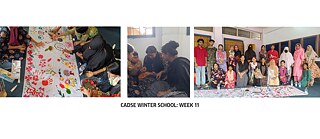
As the winter school concludes, CADSE students prepare their final projects, exploring Korail's cultural richness. They shared initial plans and received feedback on day one, then conducted research in Korail and presented updated project plans on day two. | © Paraa and Goethe Institut Bangladesh
Zine making
Hoichoi exhibition – projects by the students
The exhibition was curated by Tarannum Nibir With the support of Ruhul Abdin, Abdul Kadir.
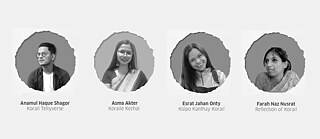
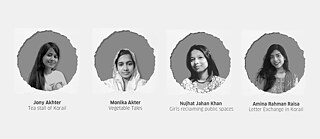
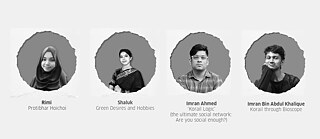
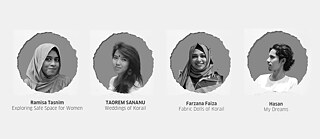
Highlights from the Winter School events
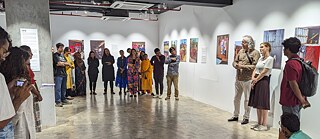
CADSE Winter school participants presenting their work at the exhibition-SNAPSHOTS. Ms. Silke Schmeer, the Political, Press and Cultural Attaché to the German Embassy was present among other audiences. | © FNQ
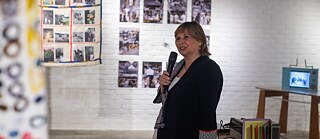
Opening ceremony of the Hoichoi event, an exhibition of the outcome of winter school inaugurated by the esteemed guests, including Her Excellency, Dr. Lilli Nichols, Canadian High Commissioner to Bangladesh. | © Paddmini Chakma
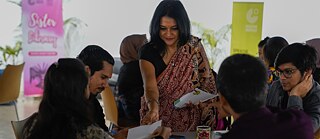
Winter School Students with writer Iffat Nawaz during the workshop, ‘Living Letters’- a joint collaboration between the Goethe-Institut, Sister Library and the Korail-City of Culture project. | © Ahadul Karim Khan
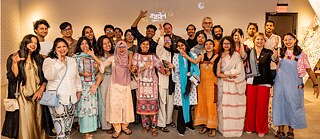
Part of the Korail- Winter School Team posing after a successful opening ceremony of the Hoichoi Exhibition. | © Rydwan Ahmed
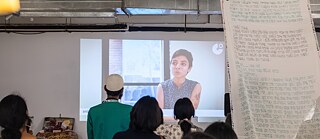
“What is winter school” video explaining the thoughts behind the project at the opening ceremony. | © Paddmini Chakma
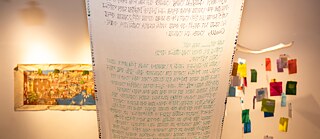
‘Vagetable Tales’ by CADSE winter school participant Monica Akter, on Hoichoi exhibition | © Rydwan Ahmed
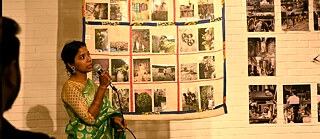
Shaluk, one of the participants of CADSE winter school explaining her outcome of the 3 months long course. | © FNQ
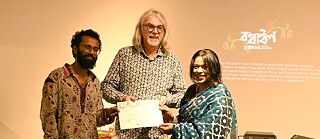
Esrat Jahan Onty received distinction from the Goethe-Institut Bangladesh and Paraa for her work ‘Kolpo Kanthay Korail’, which engaged the most with the community in Korail during the course. | © FNQ
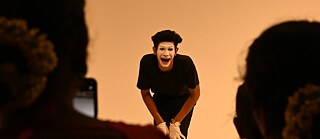
A Mime performance by Ahsan habib from the ‘Korail got talents’ event on the closing day of Hoichoi. | © FNQ
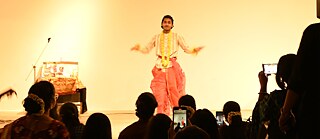
A Dance performance by Shohidul Islam Shourav from the ‘Korail got talents’ event on the closing day of Hoichoi | © FNQ
The CADSE Winter School participants
Hasib Sarowar, Shaluk Islam, Ramisa Tasnim, Esrat Jahan Onty, Imran Bin Abdul Khalique, Jony Akter, Farzana Faiza, Monika Akter, Taorem Sananu, Farhana Islam, Imran Ahmed, Asma Akter. Hasan, Md. Rafiqul Islam, Farah Naz Nusrat, Rimi Akter, Nujhat Jahan Khan, Amina Rahman Raisa, Anamul Haque Shagor, Shoheli Akter.
Contact
-
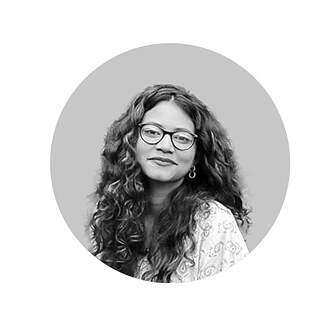
-
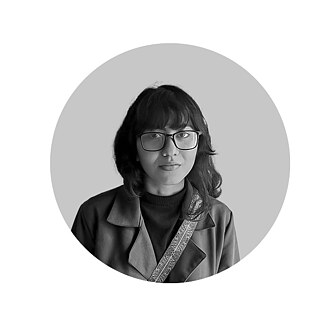
Fatima Nujhat Quaderi
Project Assistant , Goethe-Institut Bangladesh
